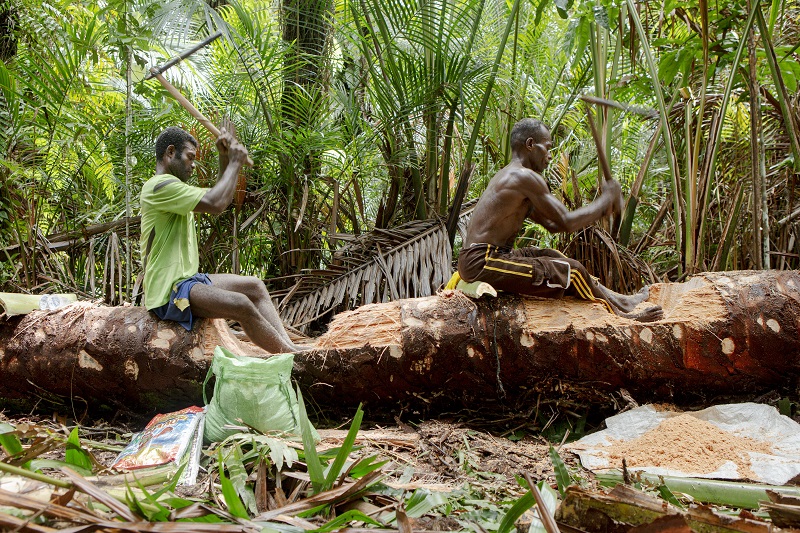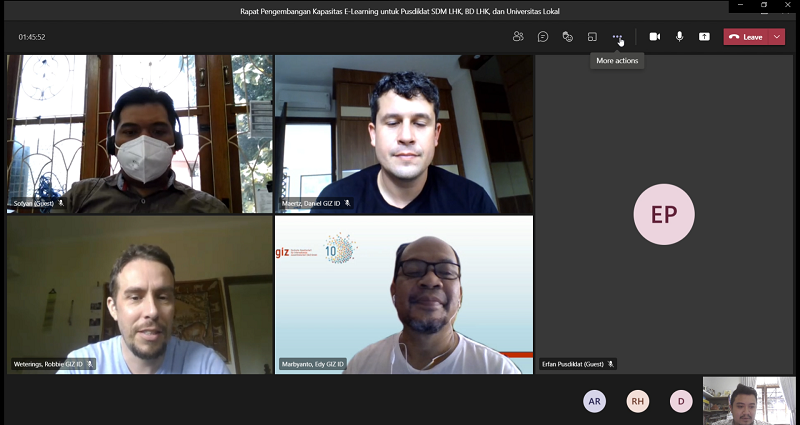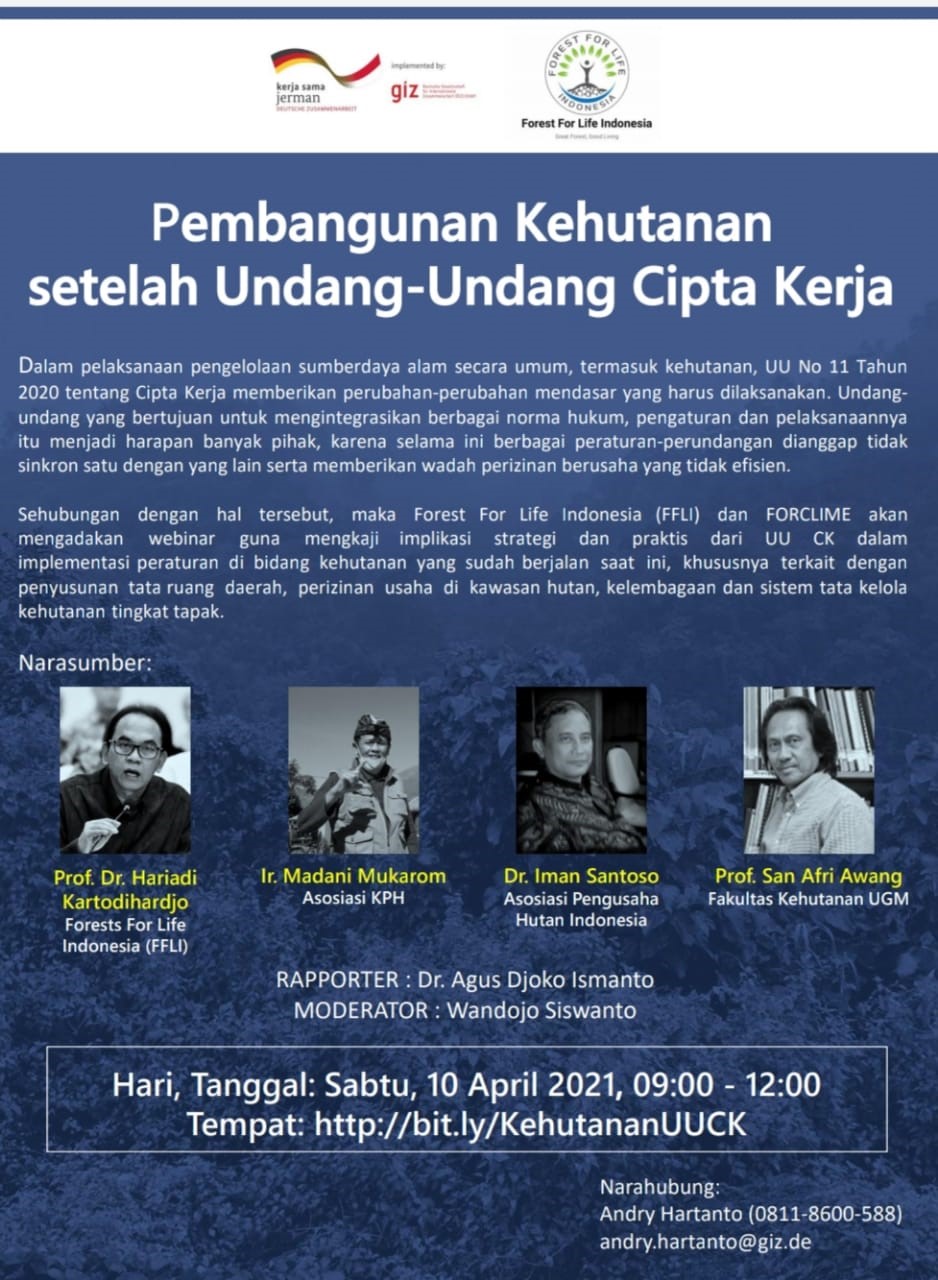FORCLIME
Forests and Climate Change ProgrammeTechnical Cooperation (TC Module)

Select your language

Aiming to identify potential cooperation related to village empowerment, including customary villages in Tanah Papua, FORCLIME together with the Ministry of Rural Development and Transmigration (Kemendes) through the Directorate of Harmonization of Natural Resources and Environment Utilization, conducted a coordination meeting on 22 April 2021. The online meeting discussed the potential cooperation at FORCLIME’s focus location in Papua, West Papua and Central Sulawesi that overlapping with the Ministry's priority locations. On the meeting, the Kemendes suggested FORCLIME to coordinate with the Village Community Empowerment Service at the district level, as it has operational duties to empower communities in the region.
During the meeting, the Director for Harmonization of Natural Resources and Environment Utilization, Dr. Sumarlan said "I hope this cooperation with GIZ can reach locations in Eastern Indonesia, which we have never facilitated before, so that these locations will experience the presence of the government there".
Follow up of this initial meeting will discuss FORCLIME's 2021 activity plan which will be synergized with the Ministry's priority activities.
For more information, please contact:
Mohammad Sidiq, Strategic area manager for Sustainable Forest Management
Edy Marbyanto, Strategic area manager for Human Capacity Development

Aiming to improve an attractive presentation of the e-learning module, the Center for Human Resources Education and Training for Environment and Forestry (Pusdiklat SDM KLHK) conducted an online coordination meeting with FORCLIME on April 20, 2021. The subject discussed in the meeting was the need to improve the e-book presentation format to be more attractive and also showing a "corporate identity" for the Training Center. FORCLIME will support the improvement of the e-learning module including providing an intern who has experience in developing e-learning and has skills in graphic design.
For more information, please contact:
Edy Marbyanto, Strategic Area Manager for Human Capacity Development
Wira Hakim,Junior Adviser for Human Capacity Development

Following meeting series between forestry experts at the Forest for Life Indonesia (FFLI) with FORCLIME on current issues related to forestry development in Indonesia, FORCLIME in collaboration with the Forest for Life Indonesia conducted a webinar on Forestry Development following the Omnibus law on job creation (UUCK) on April 10, 2021 in Bogor, West Java. The event, which was held online and offline, was moderated by FORCLIME's strategic area manager for forest policy and climate change, Wandojo Siswanto. The event was attended by 187 participants representing academics, NGOs, university students, development partners, provincial governments, central government, and the private sector.
Prof. Haryadi Kartodihardjo from the Forest for Life Indonesia (FFLI) conveyed the strategic implications of the Omnibus Law (UUCK) on licensing, community aspects, and strengthening forest management institutions outside Java through Forest Management Units (KPH). Additionally, he explained the implications of UUCK for forest management in Java (Perhutani). Then continued with explanation from Prof. San Afri Awang about the Government Regulation on Forestry Implementation (PP. 23/2021) related to the Social Forestry interventions, which are very important in Indonesia, both in Java and outside Java. One of the polemics of the issuance of UUCK against FMUs is the loss of KPH's main duties and functions to develop business. However, FMUs can still create partnerships, as outlined on articles of 204, 205, 213 of the PP 23/2021.
Furthermore, Dr. Iman Santoso, a representative from the Indonesian Forest Concession Holders Association (APHI), explained the comparisons before UUCK and post UUCK, where the existence of UUCK and its derivatives actually made forestry implementation really use a landscape approach, which under the UUCK on one landscape, one permit is sufficient for multi-entrepreneurs, additionally, is considered very profitable, easy, and cheap, with the intention to create more jobs as possible.
The last resource person, Ir. Madani Mukarom, a representative from the KPH Association conveyed the implication of UUCK is reducing the total number of KPHs because KPHs are considered as a cost-centre. In addition, human resources will also be reduced because the task has been limited to facilitation only. Moreover, the KPHs have to revise their management plan (RPHJP), because there are no independent business efforts from KPHs. Additionally, there will be no regional budget revenues (PAD) for KPHs. Apart from the implications of the UUCK, Ir. Madani also highlighted the changes of KPH's main tasks and functions on the previous government regulation compared to the PP 23/2021.
On the last session, Dr. Agus Djoko Ismanto conveyed the taken notes during the webinar that will be formulated into a policy brief. This webinar is the first series of events related to forestry development after the Omnibus Law enacted.
For more information, please contact:
Wandojo Siswanto, Strategic area manager for forest policy and climate change


